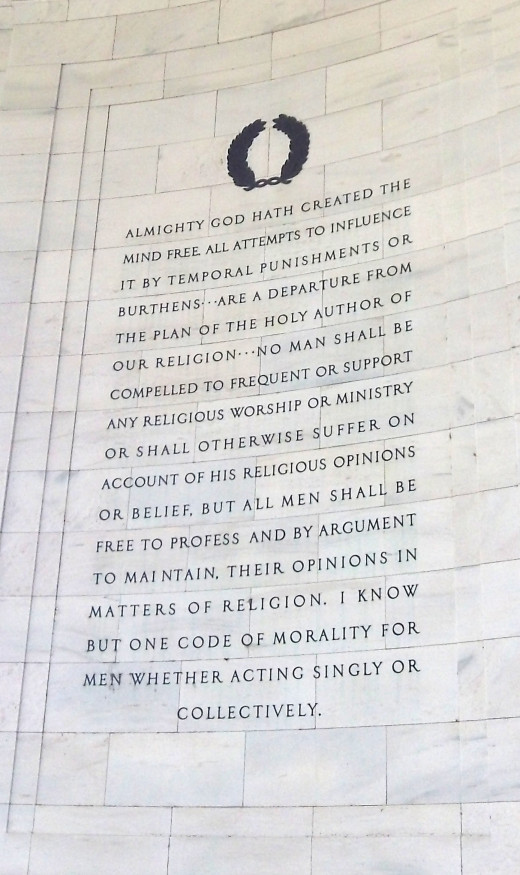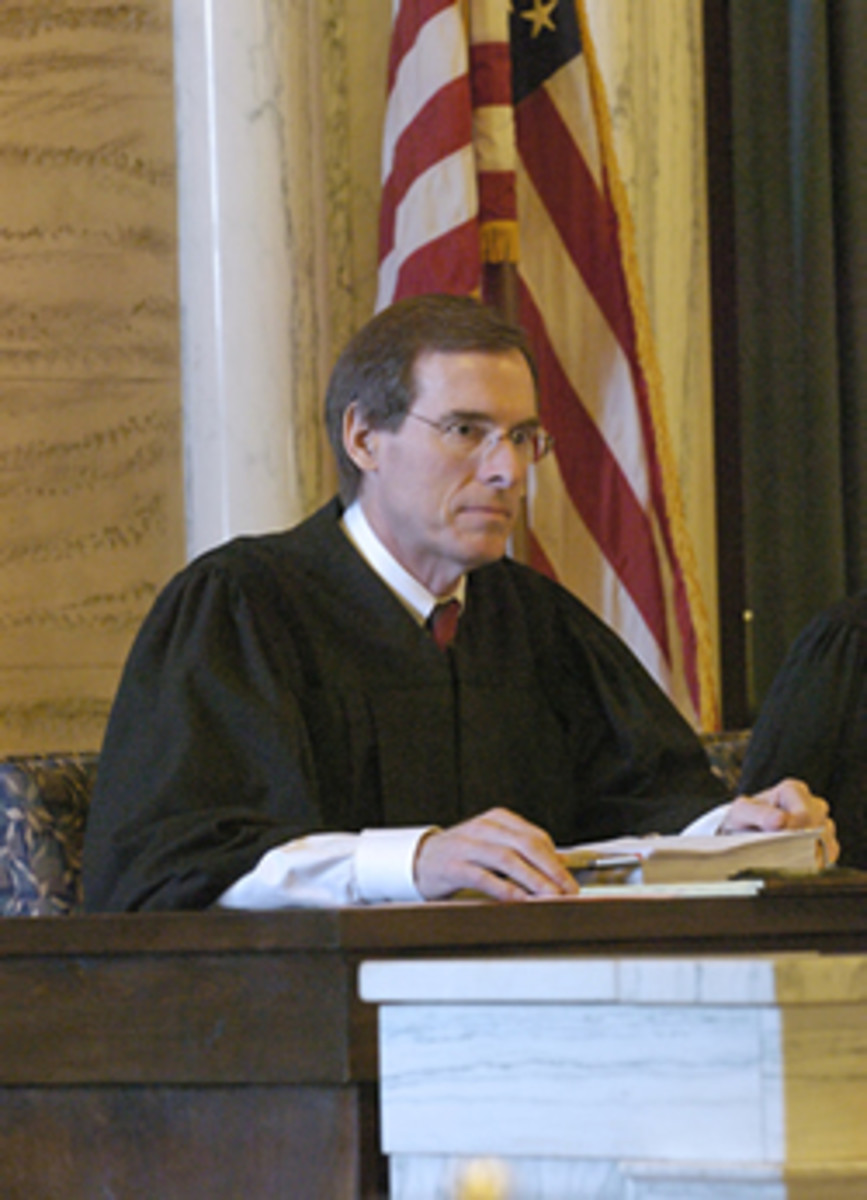Legislating Morality Harms Americans
by Kathy Batesel

Moral Legislation
For over a decade I've been interested in the concept of victimless crimes and their effects on American society. When I first came across the topic, I found myself wondering if the founding fathers had neglected a basic concept when they drafted the U.S. Constitution: They insisted that the pursuit of happiness was a basic human right, but did they fail to address when another's pursuit of happiness meant stopping someone else from enjoying their own rights?
This concept has reared its head again and again in the years since I first became aware of it. You've heard about some of the issues in the news:
- Should it be illegal to wish someone a "Merry Christmas?"
- What should happen when police raid a home and kill the owner's dog because they believe there may be drugs present, and find little to support their assertions?
- Who should be allowed to own guns, and for what reasons?
- How much freedom should a person have over their own bodies? Enough to sell organs? Donate blood? Abort a fetus?
The biggest question of all may be, "Where do you draw the line?"
Most of the stories of people who are affected by victimless crime legislation don't make it to the media. After all, who cares if you got a ticket for speeding or not wearing a seat belt? Well, you should care!
Every single American could be found guilty of at least one felony today. Yes, you too, even though you think you're a law-abiding citizen. Sure, it's not likely to happen. At least, not today. However, it doesn't take much for a goodm responsible American citizens to find themselves facing prison time, as some people have discovered the hard way in recent years.
Keep reading to learn how and why moral legislation develops, how it affects you, and what you can do about this vexing problem.
Four Categories of "Victimless" Crimes
There are four categories of victimless crimes.
- Perceived harm occurs primarily to the participant.
- Perceived harm affects only consenting adults who agree to participate in the activity.
- Perceived harm affects the "social good."
- Perceived harm affects a non-person: governments, corporations, animals, environment
Some proponents believe that by criminalizing these events, it will prevent greater harm later on. Opponents point out that similar harms occur routinely from actions that are completely legal, and argue that crimes should address actual harms that occur.
Where Do You Stand?
Which actions should be criminalized?
How Moral Legislation Develops
Right around the time I became interested in this topic, I was shocked and angered by a Baptist church service I attended. I wasn't a member of the church. I wasn't even a Baptist. I had been to other Baptist services, but none like this one. I was there as a guest, but I couldn't believe what I was hearing.
The preacher's voice boomed out over a speaker system. "J.K. Rowling is a Satanist! She has said she wants to turn children to witchcraft! As a good Christian, you have a duty to burn her books, ladies and gentlemen!" What? I'd read the Harry Potter books as soon as my children finished them, and hadn't found any reason to object to them. (With a little research, I later discovered that the source of the preacher's information had been this satire piece that had been published in The Onion as a joke.)
In the nave, I discovered a pamphlet about the church that encouraged its members to take part in their communities and government to spread Christian principles. The implication was clear in the way it was worded: Pass laws to force people to adhere to moral standards.
The idea was hardly a new one. Theocratic governments have existed since antiquity. A theocratic government is one that is based on a particular set of spiritual beliefs or is ruled by someone who claims to represent a divine being.
If you're familiar with the story of Moses, you may recall that the Egyptian Pharoah believed himself to be a god. He ordered newborn males to be thrown into the river. Moses was rescued from the Nile by the Pharoah's daughter, who named him Moses. He eventually killed Pharoah, and ultimately became the leader of the Jews that brought forth the Ten Commandments.
This example of legislated morality remains an honored part of our culture two millennia after its creation. It has become a much-used principle in our nation's laws despite the principle that the American state will govern separately from religious principles.
This principle was first described in Thomas Jefferson's letter to the Danbury Baptist Association, but was not drafted into the Constitution. Jefferson had written, "...make no law respecting an establishment of religion, or prohibiting the free exercise thereof,' thus building a wall of separation between Church and State."
The Constitution's only reference to religion says "Congress shall make no law respecting an establishment of religion, or prohibiting the free exercise thereof," even though the U.S. Supreme court often referred to Jefferson's "separation of between Church and State" many times throughout history.
It is human nature, perhaps, to conquer. Historically, that meant people killed their enemies, claimed their wives and families, and took over their land and belongings, except when they were forced to flee because their enemy had scores of followers, as Pharoah did when Moses vanquished him.
As societies grow, civil peace becomes necessary to prevent anarchy. Without guidelines to dictate behaviors, societies cannot flourish. This raises some important questions:
- What is civil peace, exactly?
- How can civil peace be ensured in a country that is founded on principles of individual freedom and happiness?
- How much civil peace is required before freedom is restricted too much?
- How much freedom should be surrendered for the purpose of achieving civil peace?
- Does human nature mean that people will continually try to conquer the people or ideas they dislike?
How Moral Legislation Affects American Citizens
The federal government and individual states crafted laws to ensure civil peace in the earliest days of this country's existence. Some laws were based on the religious principles first set forth by Moses. Some were handed down from common law practices that evolved in the old world. Still others were written based on local needs, such as when divorce could be granted or a remarriage could take place in a new country rife with dangers that hadn't yet been conquered.
Nonetheless, settlers and the founding fathers bristled at the lack of opportunity and restrictive laws in the old country, where religious differences had led many people to their deaths in the centuries immediately preceding the New World's settlement. They sought to limit restrictions in order to give people the maximum amount of freedoms while ensuring that colonies could become vital places to live and work.
Since then, the legal system they established has been used to promote this idea. However, in the process it has evolved to include other principles:
- The government has a duty to provide for its citizens' health and nutrition.
- The government has a duty to provide for its citizens' economic stability.
- The government has a duty to provide for its citizens' mental well-being.
- The government has a duty to ensure no citizens endure discomfort.
- The government has a right to tax its citizens to ensure that it can achieve these responsibilities.
These are likely to be controversial statements. They certainly aren't documented as actual governmental duties or requirements. However, examining the laws that govern our lives today reveals that the legislative process has taken steps to achieve all of these things.
Earlier, you read that you could be found guilty of a felony today. That, too, was a controversial statement, but because our law books have become so weighted with vague laws that are open to wide interpretation, it's true. If you had just one dedicated and knowledgeable enemy, particularly if he or she happens to hold a position that gives them power to act against you, you're vulnerable. Let's consider some examples where this has actually happened.
In the political arena, the word "felony" has been used in connection with former President Clinton and presidential Mitt Romney. Now, however, concerned Americans who speak up on their political views while in the presence of the President can be found guilty of a felony since H.R. 342 was signed into law by President Obama last March.
Will reporters become afraid to ask tough questions during Presidential press conferences? What can happen to a naive child who makes a thoughtless remark during a field trip to the White House when the President happens to be in an adjacent room?
Former Colorado District Attorney Jeff Ryan no longer feels safe from the law. Late one night, he became annoyed at his loud neighbors who had come home from a night of carousing. Ryan himself had been drinking, too. He approached the group of 20-somethings to ask them to quiet down, but his request turned into an argument. He reached into his pocket and got his keys out, holding them as a weapon as the argument escalated. The youths say he held a knife. Police arrived after Ryan had returned to his office. Because he had a pocket knife in his possession, he was arrested and charged with felonious menacing and could face prison time. It's completely reasonable to think a 60-year old guy might feel nervous and intimidated when he's outnumbered by younger people in better physical condition. It's equally reasonable to imagine him pulling out a knife or keys "just in case." Will he go to prison for something that anyone might have done in a similar circumstance? The jury's still out on this one, but it's evident that his clear understanding of the laws didn't protect him from getting arrested.
Two people are facing up to fifteen years in prison for recording police actions in Illinois. One of them is a woman who used her Blackberry to record the interview by Internal Affairs regarding a sexual harassment claim she filed. The other is a man who digitally recorded the police arresting him for selling his own art without a permit.
Dozens, if not hundreds, of these "unlikely" situations happen regularly within the borders of the "land of the free." Even if you're not the victim of one today, it could happen to you next week, next month, or a year from now. There are so many laws on the books that there is not a single legal expert alive who can claim to be familiar with even half of them.
These laws cost some people their freedom entirely. They severely restrict our privacy as we now must meet ever-increasing requirements before we can drive a car (registration, licensing, purchasing plates, abiding by speed limits, noise ordinances, pollution requirements, and more), eat a meal (you have a choice between whatever is on the grocery store shelves and your own food, but you cannot offer your garden vegetables to a neighbor), or go to work (until you provide plenty of proof of who you are, your right to work, and evidence of your qualifications.)
Our taxes pay the cost of prosecuting these crimes, incarcerating the guilty, and supervising their release, as discussed in Victimless Crimes.
I encourage American citizens to consider how they would answer some very important questions:
How Much Does Freedom Cost?
How much discomfort would you tolerate in order to have as much freedom as possible?
How Much Does Security Cost?
Do you think our laws help keep us more secure?
What Actions You Can Take
Regardless of your stance on these issues, you can advocate your position by contacting your state representatives and asking them to vote your way on victimless crime issues.You can locate your representative on this list.
You can speak up and influence others by discussing this topic with people who are willing to consider it or by voicing your position with one of the items listed for sale here.
You can use principles of passive resistance - the methods that historically have been most effective for promoting grass roots changes. Martin Luther King, Jr., Mahatma Ghandi, and Nelson Mandela became effective leaders that promoted change using passive resistance to set examples.
If you're really energetic, you can draft the law you'd like to see and organize a petition drive to have it placed on the ballot in your next election year.
Whatever your position, act now while you still have a chance.








